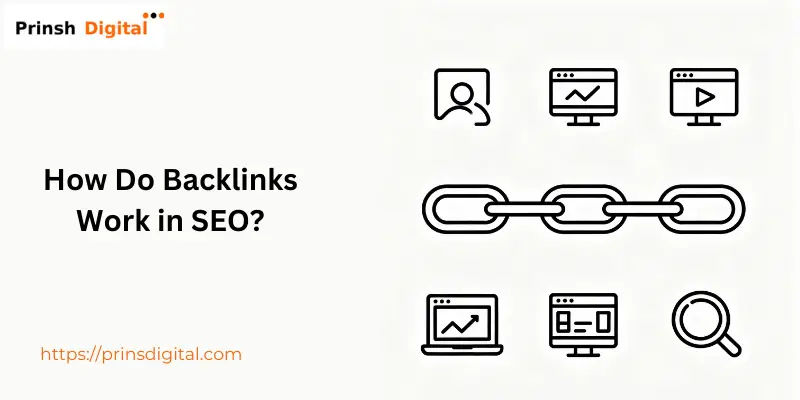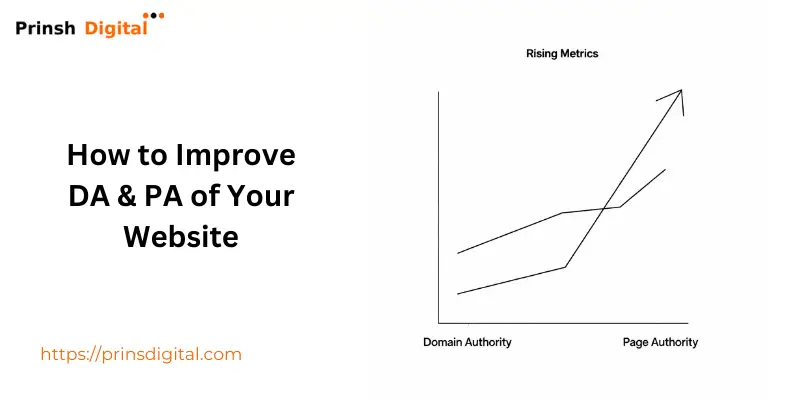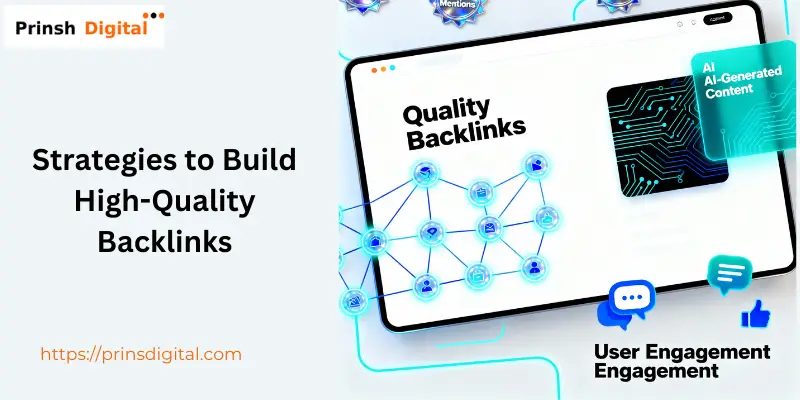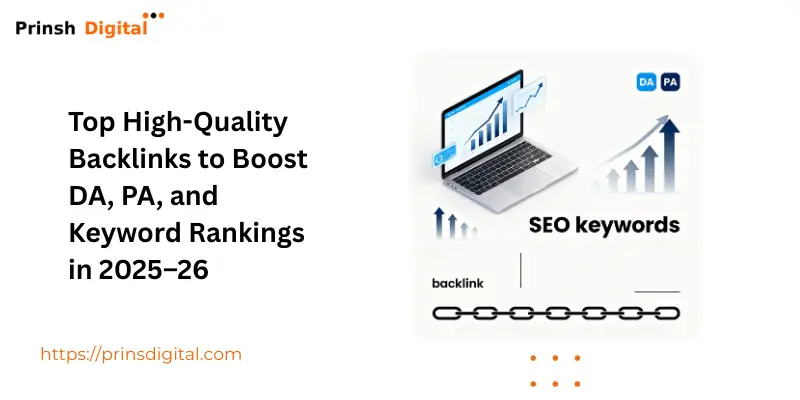Backlinks are one of the most important ranking factors in search engine optimisation (SEO) since the beginning of Google. They act as votes of confidence for your website, signalling to search engines that your content is credible, trustworthy, and worth ranking higher.
But backlink strategies keep evolving a lot in the last few years. Today, quality, relevance, and authority matter a lot.
In this blog, we’ll explore:
- What backlinks are and how they work
- The role of backlinks in SEO rankings
- The difference between good and bad backlinks
- How backlinks help to increase Domain Authority (DA) and Page Authority (PA)
- Proven strategies to build high-quality backlinks
- The future of backlinks in SEO
Table of Contents
Toggle1. What Are Backlinks?
A backlink is a link from one website to another. For example, if a popular blog links to your website in an article, that’s a backlink for you.
Backlinks are sometimes called:
- Inbound links
- Incoming links
- One-way links
From a search engine perspective, backlinks are like recommendations. The more high-quality websites links to you, the more trustworthy and authoritative your site appears.
2. How Do Backlinks Work in SEO?

Search engines like Google use backlinks as one of the most important ranking signals. Each backlink is treated as a vote for your content, but not all votes are equal.
- High-authority backlink (from News, Related niche or .gov/.edu sites) = carries a lot of weight.
- Low-quality backlink (from spammy blogs, link farms, or irrelevant sites) = carries little or no weight, sometimes even harmful.
Google’s algorithm looks at:
- Relevance → Is the linking site related to your niche?
- Authority → Does the site have strong DA/PA and trust flow?
- Diversity → Do you have backlinks from different domains, not just one?
- Anchor Text → Is the clickable text relevant to your keywords?
Example:
- Link with anchor text SEO strategies → Good for ranking SEO-related keywords.
- Link with anchor text Click here → Passes less context to Google.
Also read
- Should We Stop Creating Informational Content for Websites?
- On Page SEO Checklist (2025-26)
- Best Career Option After Graduation in 2025
3. What Makes a High-Quality Backlink?
Not all backlinks help your website. High-quality backlinks should have some or all of these.
- Comes from an authoritative website (DA 50+, trusted sources).
- Relevant to your niche (if you’re a jewellery store, a backlink from a fashion blog is better than one from a tech forum).
- Placed within content naturally (editorial links are better than footer/sidebar links).
Uses relevant anchor text (but avoid over-optimisation). - Comes from a diverse range of domains (not 1,000 links from the same site).
- DoFollow attribute (passes SEO value; NoFollow links are still useful but less powerful).
Examples of high-quality backlinks:
- Guest posts on respected industry websites
- Features in online magazines/newspapers
- Links from partners, associations, and industry directories
- Editorial mentions on niche blogs
- Local business listing sites
- Forums like (Quore, Reddit)
- Blogging sites like (Blogger, Medium)
4.How to Improve DA & PA of Your Website

Domain Authority (DA) and Page Authority (PA) are metrics developed by Moz that estimate how well a website will rank.
- DA: The overall strength of the domain (0–100 scale).
- PA: The strength of an individual page.
Although DA/PA are not direct Google ranking factors, they strongly correlate with SEO performance.
How to Increase DA/PA:
- Earn high-quality backlinks from authoritative websites.
- Create strong internal linking between pages.
- Fix technical SEO issues (broken links, sitemaps, mobile speed).
- Regularly update content to keep it fresh and relevant.
- Build a diverse backlink profile (blogs, directories, local listings, Q&A).
Top 500 High-Quality Backlink Sources for 2025–26
Building backlinks from trusted and high-authority websites is one of the fastest ways to increase your Domain Authority (DA), Page Authority (PA), and keyword rankings. I am sharing 15 quality backlink opportunities you can start using right away:
- Medium.com (DA 96) – Blogging platform for content backlinks
- Quora.com (DA 92) – Q&A site for contextual backlinks
- Reddit.com (DA 94) – Niche discussions and community links
- Pinterest.com (DA 94) – Image-based backlinks for lifestyle, fashion, food niches
- Business2Community.com (DA 89) – Guest posting & expert insights
- GitHub.com (DA 96) – Tech, open-source, and project backlinks
- Behance.net (DA 92) – Creative portfolio backlinks
- SoundCloud.com (DA 93) – For music, podcasts, and creative industries
- About.me (DA 91) – Personal branding and profile backlink
- Crunchbase.com (DA 91) – Startup & business directory backlink
- Angel.co (DA 88) – Business & investor profile backlinks
- ProductHunt.com (DA 90) – Startup & product showcase
- Tumblr.com (DA 88) – Blogging platform with dofollow opportunities
- SlideShare.net (DA 95) – Share presentations with backlinks
- LinkedIn.com (DA 98) – Profile, articles, and business backlinks
This is just a small preview from our exclusive list of 500+ high-quality backlink sources.
Want access to the complete list?
Contact us today, and we’ll share the full database of 500 backlink opportunities tailored to improve your DA, PA, traffic, and keyword rankings in 2025–26.
5. Types of Backlinks
- Natural backlinks: Links that other sites give you naturally when they find your content valuable.
- Manual backlinks: Built through outreach, guest posting, or collaboration.
- Self-created backlinks: Business listings, forum posts, blog comments (should be used carefully to avoid spam).
6. Strategies to Build High-Quality Backlinks

Here are proven strategies you can start today:
- Guest Posting – Write quality articles for niche websites and get a backlink in return.
- Resource Pages – Get listed on “best tools/resources” pages in your industry.
- Business Directories & Local Listings – Essential for local SEO (Google Business Profile, Yelp, local chamber of commerce).
- Content Marketing – Create ultimate guides, infographics, and research reports that people want to link to.
- Broken Link Building – Find broken links on websites in your niche, suggest your content as a replacement.
- Collaborations & Partnerships – Work with influencers, partners, and industry experts for cross-promotion.
- Q&A Platforms – Answer questions on Quora, Reddit, and niche forums with links to your content.
- Press Releases & PR Campaigns – Newsworthy updates can land backlinks from high-authority news outlets.
7. The Future of Backlinks in SEO
Google’s algorithm is constantly evolving, and so is link building. Here’s what to expect:
- Quality > Quantity → Fewer but stronger links will matter more.
- Topical Relevance → Links must be contextually related to your industry.
- Brand Mentions → Even unlinked mentions of your brand can help rankings.
- AI Content + Links → With AI tools creating content, Google will put more weight on unique, human-first content supported by credible backlinks.
- User Engagement Metrics → Click-through rate, time on page, and bounce rate will affect how much value Google gives to a backlink.
8. Conclusion
Backlinks are one of the strongest signals in SEO, but the focus now shifted to quality, relevance, and authority.
If you want to increase your DA, PA, traffic, and rankings:
- Prioritise building relationships with niche websites.
- Create valuable content that naturally attracts links.
- Avoid spammy shortcuts that could harm your site.
A sustainable link-building strategy requires patience, creativity, and consistent effort to get the rewards in long-term SEO growth.



